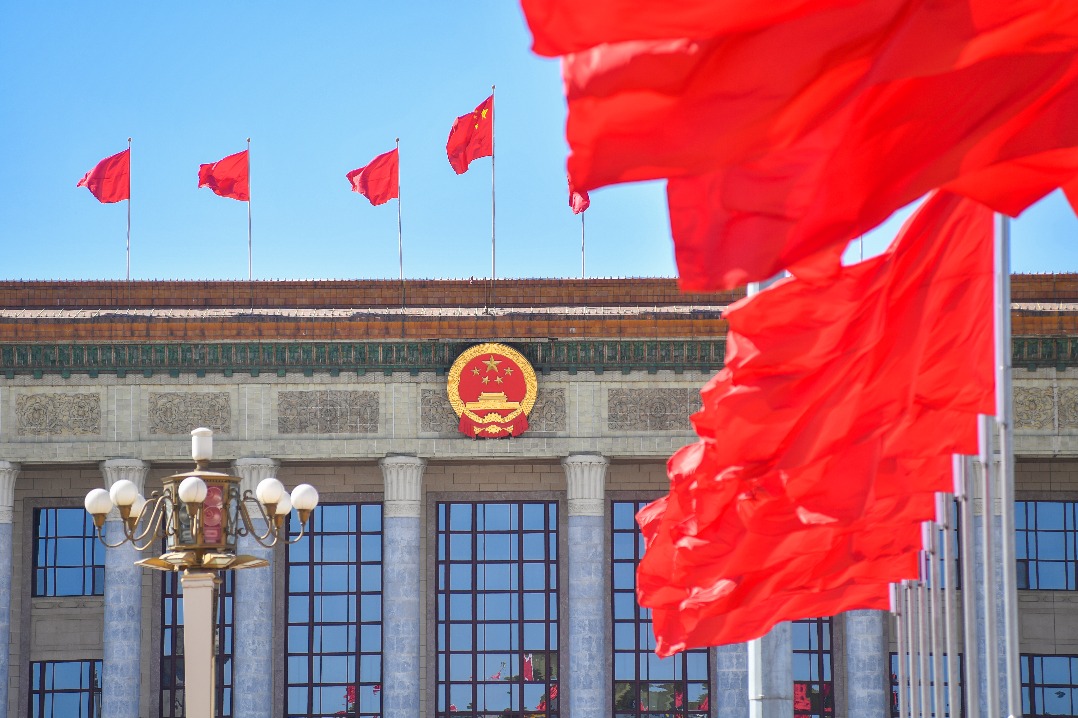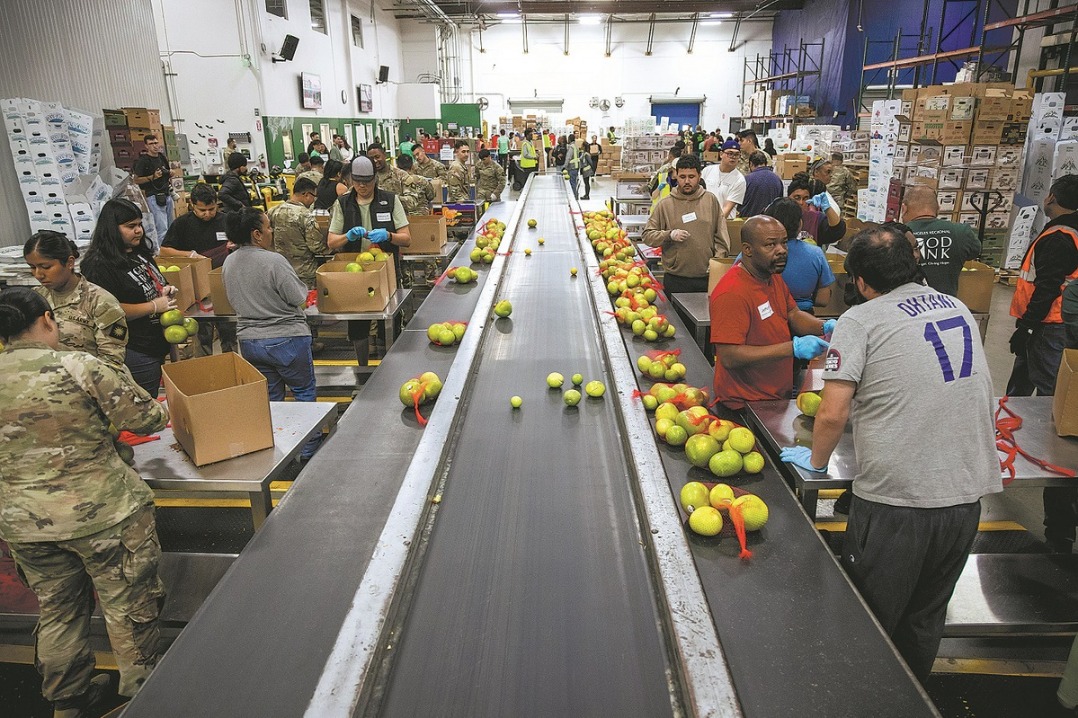NATO serves US' hegemony at EU's expense

Editor's note: The NATO's expansion into the Asia-Pacific will heighten geopolitical risks and threaten the region's prosperity and stability. This attempted expansion into Asia reflects NATO's Cold War mentality and raises serious concerns about the alliance's role in undermining regional peace. Three experts share their views on the issue with China Daily.

The NATO Summit, to be held in Washington from Tuesday to Thursday, is expected to provide more military aid, financial support and personnel training to Ukraine with the not-so-covert intention of prolonging the Russia-Ukraine conflict, in order to weaken Russia. The summit is also likely to accuse both Moscow and Beijing of challenging the West-led world order and posing a threat to the security of the US-led West.
However, it is the North Atlantic Treaty Organization that actually poses a threat to global peace and security. A relic of the Cold War, NATO, after its radical transformation and aggressive eastward expansion, has become a tool for the United States to maintain its global hegemony.
The Joe Biden administration attaches great importance to the NATO Summit, because it aims to use it to target Russia and China. After its Brussels summit in 2021, NATO has not only set its long-term goals, including those of building ideological blocs and triggering bloc confrontations to gain geostrategic advantages, but also taken a series of military actions that have sparked a global arms race.
First, the drastic increase in NATO's defense budget has been draining the resources of the organization's European member states, with the spending for 2024 increasing by 18 percent year-on-year. Also, 23 of the 32 NATO member states have vowed to spend more than 2 percent of their GDP on defense this year, with Germany spending $97.7 billion, more than the United Kingdom, to become NATO's second-largest spender on defense.
Second, NATO has expanded eastward, reaching tantalizingly close to Russia's borders, while the under-construction NATO base in Romania, spread over 28 square kilometers, is set to become the largest military base in Europe, capable of accommodating tens of thousands of troops and stockpiling tons of weapons and equipment. NATO has also decided to build a new command center in Wiesbaden, Germany, to coordinate the strategic assistance for Ukraine, and Finland and Sweden, new NATO members, have signed defense cooperation agreements allowing US forces to use their military bases, thus posing a threat to Russia.
Third, NATO plans to take some nuclear missiles out of the silos and put them on standby in some European Union countries to reassure its European members that it remains committed to safeguarding their security. NATO may claim its move is justified from the Western security perspective and necessary for preventing Russia's "military provocations", but in effect, it is harmful to other countries' national security.
Indeed, NATO's expansion and militarization have disrupted global peace and undermined security. In fact, NATO has instilled the fear of Russia and China into some European and Asia-Pacific countries, making them increasingly dependent on NATO for their "national security".
At its summit in Vilnius last year, NATO accused China of posing a "systemic challenge" to Euro-Atlantic security and "secretly expanding its nuclear arsenal". And earlier this month, the NATO secretary-general accused China of fueling the biggest armed conflict in Europe since the end of World War II. Such blatant distortions of facts have been damaging China-Europe relations.
The reality is that NATO's expansion and militarization pose a serious threat to the global arms control regime, and disarmament and nuclear nonproliferation efforts. The US pulled Ukraine into the Western camp by helping NATO expand eastward, thus creating an imbalance in the European security landscape and triggering the Russia-Ukraine conflict. Subsequently, the US used the Ukraine crisis to prompt NATO's European members to "generously" increase their military spending and purchase large amounts of US military equipment to aid Ukraine.
The US has manipulated NATO into conducting large-scale military exercises. For instance, NATO's Exercise Steadfast Defender 2024 involved more than 50 naval assets, 80 aircraft, 1,100 combat vehicles and over 90,000 troops. The displays of NATO's combat power have provoked Russia into taking countermeasures, exacerbating tensions in the European Union and Eurasia. What has raised tensions further is Russia's withdrawal from the Treaty on Conventional Armed Forces in Europe and deployment of tactical nuclear missiles on the Russian-European border.
In order to fuel NATO's eastward expansion, leading to conflict between Russia and Ukraine, Washington forced NATO's European members to join hands with the US to weaken Russia. The security panic thus created prompted even French President Emmanuel Macron to stop advocating for Europe's strategic autonomy and independent foreign and defense policies.
All these moves have benefited only the military-industrial complex, which has been making huge profits by selling arms and equipment to not only Ukraine but also EU countries.
Equally important, the surge in NATO's military spending has, to some extent, reduced the international community's spending on climate actions. At a time when countries should be devoting more funds and efforts to combat climate change, European Union countries are splurging on weapons and military equipment all because of the US.
The arms race triggered by the Ukraine crisis has constrained the advancement of the EU's Green Deal. The EU member states, especially NATO's European members have spent hundreds of billions of euros on purchasing US weapons to counter the perceived threat from Russia. If the Russia-Ukraine conflict drags on, the biggest beneficiary will be the US and the biggest losers the EU member states.
NATO's arms buildup will weaken international cooperation to address common global challenges. Washington is obsessed with the Ukraine crisis, because it believes the longer Moscow is engaged in the conflict the weaker it will become and the easier it will be for the US to use NATO to maintain its global hegemony, even at the cost of global peace and development.
That's why Washington is likely to use the NATO Summit to tighten its stranglehold on Europe and target Russia and China.

The views don't necessarily represent those of China Daily.
If you have a specific expertise, or would like to share your thought about our stories, then send us your writings at opinion@chinadaily.com.cn, and comment@chinadaily.com.cn.


































